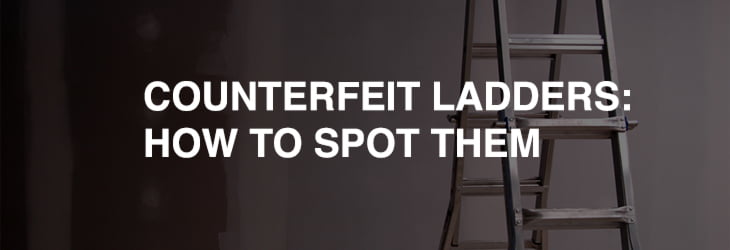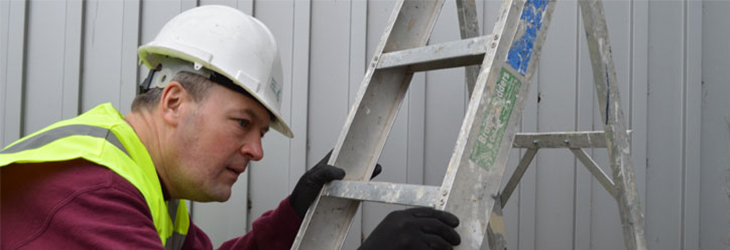Counterfeit ladders: How to spot them
04/01/2016

Last month BBC’s Fake Britain reported that there had been a great deal of ladders sold to consumers, which claimed to be compliant with the British and European Standards when in reality they did not meet these requirements. Poorly constructed, unregulated access equipment, including the ladders described above, carry a huge number of risks – compromising the health and safety of those that use them.
The BBC show explained how many reputable wholesalers and suppliers are often led to believe that the ladders and step ladders they are selling are in compliance with relevant standards and are therefore safe and fit for purpose.
The Ladder Association, which represents the leading manufacturers, suppliers and ladder training companies in the UK, is warning that these counterfeits could be extremely dangerous and that consumers need to take extra care.
The Ladder Association warns “to be compliant, a ladder must meet all the applicable requirements of the relevant standard. If it fails to do so, it should not be offered for sale or purchased.” They recommend that upon purchasing, a consumer ask the manufacturer importer for a certificate of compliance from an accredited, independent third party test organisation. After all, lives could be at risk, let alone livelihoods.
Tips on spotting fake access equipment

Upon buying your next ladder or piece of access equipment, consider the following to ensure the product meets the all important health and safety standards.
- Do you research before buying an item
Find out what the product looks like and any unique features. Check the product you are buying has all the same features as the product you’ve been researching. You may also be able to find images of a fake and learn how it will differ.
- Make sure it complies with EU/UK standards
All ladders manufactured and supplied within the United Kingdom and the European Union should be manufactured to specified standards and correctly classified. You should find details of this when looking at the specification and details of any product. These requirements apply to all portable ladder types, specialist single use ladders, and fixed access ladders. The three main classifications of ladder you’ll see are Class 1, Class EN131 and Class III. The former is of the highest strength and quality, and suited to heavy-duty work, while the latter is only suitable for occasional domestic tasks. Class EN131 is the classification usually given to ladders suited to light trade work or heavy-duty DIY work.
- Purchase from a reputable supplier
While it may be tempting to shop around and buy from the cheapest online store, it pays to choose a professional supplier. Buy from a store that specialises in access equipment and thrives upon its good reputation – like Browns Ladders. A trader should also have a returns policy or guarantee. Most rogue traders will not offer this. Checking out customer reviews is also another great way to check out a store’s reliability.
It’s also a good idea to buy on credit card. This means that should you receive a product that you’re not entirely happy with, you’ll receive the best protection compared with other payment methods. With a credit card you can dispute a charge if you purchase misrepresented, or fake merchandise.
To find out more about any of the products on the Browns Ladders website don’t hesitate to call our team on 01282 615517. We have plenty of useful product information online, but always happy to provide more should you wish.